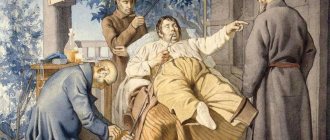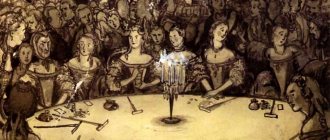Ivan Turgenev - Two landowners
1
Ivan Sergeevich Turgenev
TWO LANDLORDS
I have already had the honor of introducing to you, gracious readers, some of my gentlemen neighbors; allow me now, by the way (for our brother the writer, everything is by the way), to introduce you to two more landowners with whom I often hunted, very respectable people, well-intentioned and enjoying the universal respect of several districts.
First, I will describe to you retired Major General Vyacheslav Illarionovich Khvalynsky. Imagine a tall and once slender man, now somewhat flabby, but not at all decrepit, not even outdated, a man in adulthood, in his prime, as they say. True, the once correct and now still pleasant features of his face have changed a little, his cheeks have drooped, frequent wrinkles are located radially around his eyes, other teeth are no longer there, as Saadi said, according to Pushkin; brown hair, at least all those that remained intact, turned purple thanks to the composition purchased at the Romny horse fair from a Jew posing as an Armenian; but Vyacheslav Illarionovich speaks smartly, laughs loudly, jingles his spurs, twirls his mustache, and finally calls himself an old cavalryman, while it is known that real old men never call themselves old men. He usually wears a frock coat, buttoned to the top, a high tie with starched collars, and gray trousers with a sparkle, military cut; he puts the hat directly on his forehead, leaving the entire back of his head exposed. He is a very kind person, but with rather strange concepts and habits. For example: he cannot in any way treat nobles who are not rich or unofficial as equals. When talking to them, he usually looks at them from the side, leaning his cheek heavily into the hard and white collar, or suddenly he will illuminate them with a clear and motionless gaze, remain silent and move all his skin under the hair on his head; He even pronounces words differently and does not say, for example: “Thank you, Pavel Vasilich,” or: “Come here, Mikhailo Ivanovich,” but: “Bold, Pall Asilich,” or: “Come here, Mikhail Vanich.” He treats people at the lower levels of society even more strangely: he doesn’t look at them at all and, before he explains his desire to them or gives them an order, he repeats several times in a row, with a preoccupied and dreamy look: “What’s your name?” . what is your name?”, striking unusually sharply on the first word “how,” and pronouncing the rest very quickly, which gives the whole saying a fairly close resemblance to the cry of a male quail. He was a troublemaker and a terrible man, and a bad master: he took as his manager a retired sergeant, a Little Russian, an unusually stupid man. However, in the matter of farming, no one has yet surpassed one important St. Petersburg official, who, seeing from the reports of his clerk that the barns on his estate were often exposed to fires, as a result of which a lot of grain was lost, gave the strictest order: do not plant ahead until then sheaves into the barn until the fire goes out completely. The same dignitary decided to sow all his fields with poppy, as a result of a very apparently simple calculation: poppy, they say, is more expensive than rye, therefore, it is more profitable to sow poppy. He ordered his serf women to wear kokoshniks according to the model sent from St. Petersburg; and indeed, women on his estates still wear kokoshniks... only on top of their kicheks... But let’s return to Vyacheslav Illarionovich. Vyacheslav Illarionovich is a terrible hunter of the fair sex and, as soon as he sees a pretty person on the boulevard in his district town, he immediately sets off after her, but immediately goes lame - that’s what a remarkable circumstance. He likes to play cards, but only with people of lower rank; They say to him: “Your Excellency,” but he pushes them and scolds them as much as his heart desires. When he happens to play with the governor or with some official person, an amazing change occurs in him: he smiles, and nods his head, and looks into their eyes - he just smells like honey... He even loses and doesn’t complains. Vyacheslav Illarionich reads little, and while reading he constantly moves his mustache and eyebrows, first his mustache, then his eyebrows, as if he were sending a wave up and down his face. This wave-like movement on the face of Vyacheslav Illarionich is especially remarkable when he happens (in front of guests, of course) to run through the columns of the Journal des Debats. He plays a fairly significant role in the elections, but due to his stinginess he refuses the honorary title of leader. “Gentlemen,” he usually says to the nobles approaching him, and speaks in a voice full of patronage and independence, “I am very grateful for the honor; but I decided to devote my leisure time to solitude.” And, having said these words, he will move his head several times to the right and to the left, and then with dignity he will place his chin and cheeks on his tie. In his younger years, he was an adjutant to some significant person, whom he does not call by name or patronymic; they say that he took on more than just adjutant duties, as if, for example, dressed in full dress uniform and even fastening the hooks, he steamed his boss in the bathhouse - but not every rumor can be trusted. However, General Khvalynsky himself does not like to talk about his official career, which is generally quite strange: it seems that he has never been to war either. General Khvalynsky lives in a small house, alone; He has not experienced marital happiness in his life and therefore is still considered a groom, and even a profitable suitor. But his housekeeper, a woman of about thirty-five, black-eyed, black-browed, plump, fresh-faced and with a mustache, wears starched dresses on weekdays, and puts on muslin sleeves on Sundays. Vyacheslav Illarionovich is good at large dinner parties given by landowners in honor of governors and other authorities: here he, one might say, is completely at ease. In such cases, he usually sits, if not at the right hand of the governor, then not far from him; at the beginning of dinner, he adheres more to his sense of self-esteem and, leaning back, but without turning his head, glances from the side down the round backs of the heads and stand-up collars of the guests; but by the end of the table he is cheerful, begins to smile in all directions (he has been smiling in the direction of the governor since the beginning of dinner), and sometimes even proposes a toast in honor of the fair sex, the adornment of our planet, in his words. General Khvalynsky is also not bad at all ceremonial and public events, exams, meetings and exhibitions; The master also approaches the blessing. At crossings, crossings and other similar places, Vyacheslav Illarionich’s people do not make noise or shout; on the contrary, when pushing people aside or calling for a carriage, they say in a pleasant throaty baritone: “Let me, let me, let General Khvalynsky pass,” or: “General Khvalynsky’s crew...” The crew, however, Khvalynsky’s uniform is quite old; on the footmen the livery is rather shabby (the fact that it is gray with red piping seems to hardly need to be mentioned); the horses have also lived well and served in their lifetime, but Vyacheslav Illarionich has no pretensions to panache and does not even consider it proper for his rank to show off. Khvalynsky does not have a special gift of speech, or perhaps does not have the opportunity to show his eloquence, because he does not tolerate not only argument, but generally objections and carefully avoids any long conversations, especially with young people. It is indeed truer; Otherwise, there’s a problem with the current people: they will just fall out of obedience and lose respect. In front of higher persons, Khvalynsky is mostly silent, and to lower persons, whom he apparently despises, but with whom he only knows, he keeps his speeches abrupt and sharp, constantly using expressions similar to the following: “But this, however, you are talking about nonsense.” ; or: “I am finally forced, my dear Lord, to show you”; or: “Finally, you must, however, know who you are dealing with,” etc. Postmasters, permanent assessors and station wardens are especially afraid of him. He doesn’t receive anyone at home and, as you can hear, lives as a miser. With all that, he is a wonderful landowner. “An old servant, a disinterested man, with rules, vieux grognard”[1] - his neighbors say about him. One provincial prosecutor allows himself to smile when they mention in his presence the excellent and solid qualities of General Khvalynsky - but what does envy not do!..
However, let’s now move on to another landowner.
Mardarii Apollonych Stegunov was in no way like Khvalynsky; he hardly served anywhere and was never considered handsome. Mardarius Apollonich is an old man, short, plump, bald, with a double chin, soft arms and a decent belly. He is a great hospitable and joker; lives, as they say, for his own pleasure; winter and summer he wears a striped dressing gown with cotton wool. He only agreed on one thing with General Khvalynsky: he is also a bachelor. He has five hundred souls. Mardary Apollonych deals with his estate rather superficially; To keep up with the times, ten years ago, I bought a threshing machine from Butenop in Moscow, locked it in a barn, and calmed down. On a nice summer day, they tell you to start a racing droshky and go to the field to look at the grain and pick cornflowers. Mardary Apollonych lives in a completely old way. And his house is of ancient construction: in the hall there is a proper smell of kvass, tallow candles and leather; immediately to the right there is a cupboard with pipes and cleaning utensils; in the dining room there are family portraits, flies, a large pot of erani and sour pianofortes; in the living room there are three sofas, three tables, two mirrors and a hoarse clock, with blackened enamel and bronze, carved hands; in the office there is a table with papers, bluish screens with pasted pictures cut out from various works of the last century, cabinets with stinking books, spiders and black dust, a plump armchair, an Italian window and a tightly boarded door to the garden... In a word, everything is as usual. Mardarius Apollonych has a lot of people, and everyone is dressed in the old-fashioned way: in long blue caftans with high collars, dull trousers and short yellowish vests. They say to guests: “father.” His housekeeping is managed by a peasant bailiff with a beard that covers his entire sheepskin coat; home - an old woman, tied with a brown scarf, wrinkled and stingy. In the stables of Mardarius Apollonych there are thirty horses of different sizes; he leaves in a home-made carriage that weighs one and a half hundred pounds. He receives guests very cordially and treats them to glory, that is: thanks to the intoxicating properties of Russian cuisine, he deprives them until the very evening of any opportunity to do anything other than show preference. He himself never does anything and even stopped reading the Dream Book. But we still have quite a lot of such landowners in Rus'; the question arises: why on earth did I talk about him and why?.. But instead of answering, let me tell you one of my visits to Mardarius Apollonych.
1
However, let’s now move on to another landowner.
Mardarii Apollonych Stegunov was in no way like Khvalynsky; he hardly served anywhere and was never considered handsome. Mardarius Apollonich is an old man, short, plump, bald, with a double chin, soft arms and a decent belly. He is a great hospitable and joker; lives, as they say, for his own pleasure; winter and summer he wears a striped dressing gown with cotton wool. He only agreed on one thing with General Khvalynsky: he is also a bachelor. He has five hundred souls. Mardary Apollonych deals with his estate rather superficially; To keep up with the times, ten years ago, I bought a threshing machine from Butenop in Moscow, locked it in a barn, and calmed down. On a nice summer day, they tell you to start a racing droshky and go to the field to look at the grain and pick cornflowers. Mardary Apollonych lives in a completely old way. And his house is of ancient construction: in the hall there is a proper smell of kvass, tallow candles and leather; immediately to the right there is a cupboard with pipes and cleaning utensils; in the dining room there are family portraits, flies, a large pot of erani and sour pianofortes; in the living room there are three sofas, three tables, two mirrors and a hoarse clock, with blackened enamel and bronze, carved hands; in the office there is a table with papers, bluish screens with pasted pictures cut out from various works of the last century, cabinets with stinking books, spiders and black dust, a plump armchair, an Italian window and a tightly boarded door to the garden... In a word, everything is as usual. Mardarius Apollonych has a lot of people, and everyone is dressed in the old-fashioned way: in long blue caftans with high collars, dull trousers and short yellowish vests. They say to guests: “father.” His housekeeping is managed by a peasant bailiff with a beard that covers his entire sheepskin coat; home - an old woman, tied with a brown scarf, wrinkled and stingy. In the stables of Mardarius Apollonych there are thirty horses of different sizes; he leaves in a home-made carriage that weighs one and a half hundred pounds. He receives guests very cordially and treats them to glory, that is: thanks to the intoxicating properties of Russian cuisine, he deprives them until the very evening of any opportunity to do anything other than show preference. He himself never does anything and even stopped reading the Dream Book. But we still have quite a lot of such landowners in Rus'; the question arises: why on earth did I talk about him and why?.. But instead of answering, let me tell you one of my visits to Mardarius Apollonych.
I came to him in the summer, around seven in the evening. His all-night vigil had just passed, and the priest, a young man, apparently very timid and recently graduated from the seminary, was sitting in the living room near the door, on the very edge of his chair. Mardarii Apollonich, as usual, received me extremely kindly: he was genuinely happy with every guest, and he was generally a kind person. The priest stood up and took his hat.
“Wait, wait, father,” Mardarius Apollonych spoke, without letting go of my hand, “don’t go... I told you to bring me some vodka.”
“I don’t drink, sir,” the priest muttered with confusion and blushed to his ears.
- What nonsense! How can you not drink in your rank! - answered Mardary Apollonych. - Bear! Yushka! vodka for father!


